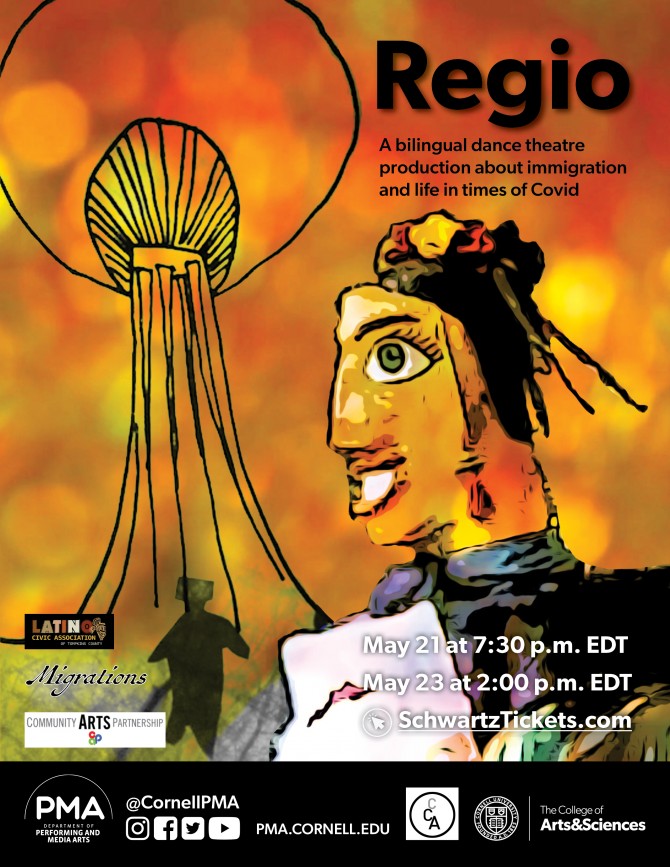News directly from Cornell's colleges and centers
Bilingual “Regio (Royal)” highlights lives of immigrant Latinx workers
By Juan Manuel Aldape Muñoz
“Regio (Royal),” a new theatre production that uses contemporary dance and puppetry to share stories about Latinx immigrant workers affected by the COVID-19 pandemic, premiers online May 21 and 23, produced by the Department of Performing and Media Arts, College of Arts and Sciences.
The performance is a collaboration between choreographer Juan Manuel Aldape Muñoz, members of Lilypad Puppet Theatre, and Latinx dancers from the Ithaca community. This project is supported by the Cornell Council for the Arts, Community Arts Partnership, Latino Civic Association of Tompkins County, Migrations Initiative, and the Festival of Latin American Contemporary Choreographers. Regio (Royal) contains strong language.
"Regio (Royal)" will stream online on Friday, May 21 at 7:30 p.m. and Sunday, May 23 at 2:00 p.m. Reserve a free ticket at schwartztickets.com.
“Regio (Royal)” brings an embodied dimension to the discussions of the lives of factory workers impacted by the pandemic. This performance is part of Aldape Muñoz’s decades-long focus on creating performances that reveal and amplify the experiences of immigrant workers (both documented and undocumented) from Central America and Mexico whose labor is essential to American industries.
The pandemic has devastated Latinx and Black communities the most in the United States. In particular, meat factories that employ Latinx workers have had some of the highest single-cluster outbreaks. “Regio (Royal)” will use the power of theatrical and puppetry encounters between performers and audiences to create a collective sense of how immigration impacts everyone.
The performance incorporates two 11-feet tall mojiganga puppets into the performance because of the puppets’ cultural relevance to the themes addressed in the performance. Mojigangas are large figurines constructed from papier-mâché and cardboard. They are popular in the states of Guanajuato and Oaxaca, Mexico, regions with a high percentage of out-migration to the United States. These puppets originated in Spain to represent nobles and royalty and were introduced to the Americas during the colonization period. The mojigangas in this performance are fashioned after the factory workers and their uniforms, appropriating their original meaning of regality and re-signifying it to the working class immigrant.
The puppets will dance alongside performers to accompanying narrations about the conditions of working in factories without the proper equipment. The stories emphasize narratives of hardship, resilience, and hope. The dancers will express the physical labor that is required of these workers, as well as the precarity of their bodies in these factory plants and how they find inspiration for better conditions.
Juan Manuel Aldape Muñoz is a Mellon Postdoctoral Fellow in the Society for the Humanities and the Department of Performing and Media Arts.
Read the story on the College of Arts and Sciences website.
Media Contact
Get Cornell news delivered right to your inbox.
Subscribe

